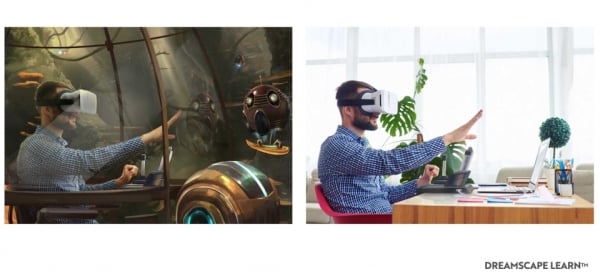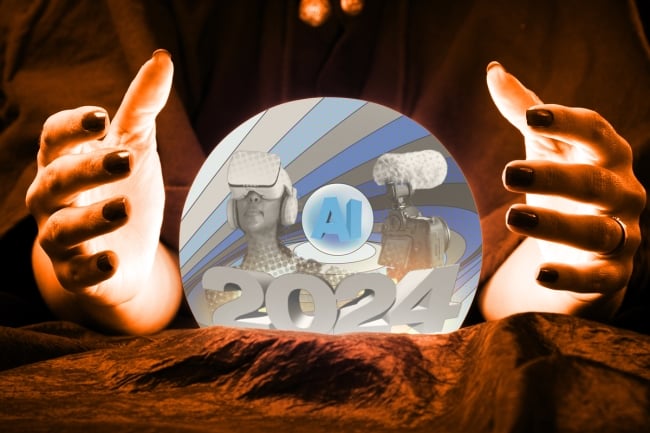What’s Next for Ed Tech in 2024
After a 2023 filled with “metaversities,” robots rolling across campuses and artificial intelligence tools spurring both anxiety and excitement, what could this coming year have in store for higher ed technology? Inside Higher Ed spoke with experts who predicted what might be next for classrooms and institutions in the months ahead.
AI for Teaching
The star of the show is, unsurprisingly, AI.
“It’s the way of the future, and it’s almost like, ‘Get out of the way or get run over,’” said Marco Johnson, president and CEO of Accreditation Advisors Group. “And if you’re not jumping on the train, you better hop off, because you can’t stop it.”
After going mainstream following the launch of OpenAI’s ChatGPT in November 2022, AI started appearing in many classrooms last spring. Adoption continued in last fall, with college students across the nation turning to AI tools. Meanwhile, institutions began using AI for enterprise functions, such as streamlining admissions and financial aid processes and creating courses on ChatGPT.
Next up could be greater adoption of AI as a teaching tool.
“AI has been heavy on operational efficiency,” said Hernan Londono, chief technology and innovation strategist for education at Dell Technologies. He pointed to recruitment, admissions, retention and fundraising. “Everyone under the sun is using AI, but not for teaching, so that will start to come.”
Professors could begin using it for personalization, according to Kadriye Ercikan, vice president of the research and measurement sciences area at Educational Testing Services.
“We’re in the early stages of creating a new paradigm for personalized assessment and learning; it’s critical for moving the field forward,” she said. “It’s supporting teachers in the classroom to personalize their teaching by using AI to provide feedback for individual learners and pointing in the direction where students can go.”
AI adoption also could spell a win—or a loss—for admissions, said Johnson and Roy Mathew, who leads higher education consulting at Deloitte.
“This generation of students is more apt to look into this, and then you have the institutions saying, ‘We’re not bringing in AI,’” Johnson said. “It may turn off some students. Educators are data-driven people; it’s always, ‘Let’s see some studies.’ But you wait too long, you fall behind.”
“I think there are going to be folks who have already embraced it, [those who] are well on their way and others will be reluctantly dragged along,” Mathew said. “If [students] don’t get to experience this in the curriculum, five years from now it impacts their career prospects. So, they will speak with their feet.”
Exploring the ethics of AI in education—conversations that are just beginning on many campuses—will also play an important role in 2024.
“There will be a dominance of headlines about AI, not because we have important things to say about AI, but we have incredible anxiety about AI,” said Bridget Burns, CEO of the University Innovation Alliance.
Londono expects there to be a focus on AI privacy and fairness issues. And Ercikan added that it’s “critical” for tech companies to address ethical issues, such as data access and how AI is developed.
“How algorithms are developed and whether they service individuals from different backgrounds is really critical to look into as we think of the future of education,” she said.
Virtual Reality Takes Off
Even as AI shook many aspects of higher ed last year, other technologies were creating entirely different realities to support teaching and learning.
Arizona State University set the bar in 2023 with the use of virtual reality, work that could spread to other campuses in 2024, Burns said.
“They have reimagined science, period,” Burns said, referencing the use of immersive virtual reality in introductory biology labs. “We’re using more innovation in the classroom than ever, and the appetite to dabble and try it is greater than before.”

Dell’s Londono pointed toward the new Quest 3 headset from Meta, the parent company of Facebook, as an example of extended and virtual reality technology becoming more accessible to classrooms.
“Anything related to extended and virtual reality tech is developing a bit more,” he said. “The fidelity of the experience is a lot higher. Every time it happens, you think of its impact on instruction [in the classroom].”
Deloitte’s Mathew agreed that VR is a technology to watch in 2024.
“There’s a wave embracing all the technologies to take the student experience to another level,” he said. “And with VR, it is so much easier to show them how to do it versus reading out of a textbook.”
Classrooms Go High-Tech
For education grounded in the real world, hybrid learning has moved from a novel concept to the norm at many institutions. This coming year will likely see more work improving classrooms to support hybrid learning.
“Since the pandemic, there are usually two sets of transformations happening,” Deloitte’s Mathew said. “Some schools are still doing nothing and continuing on with the status quo of traditional classrooms, but there’s a whole bunch of universities transforming their classrooms to enable hybrid modality.”
He mentioned the wave of institutions upgrading for hybrid and HyFlex environments, going beyond just recording a lecture and placing it online or live-streaming from the classroom.
The new digitally focused classrooms can feature upgraded projectors, which can display Zoom chats on screens so students both in and out of the classroom can interact. These classrooms also may contain more video screens, to create an immersive online experience along with having teacher assistants in the classroom answering online students’ questions.

Getty Images
New kinds of internet-connected sensors will also be added in classrooms, according to Dell’s Londono. The sensors, part of the technology known as the internet of things, or IoT, share data in real time. They have a slew of purposes, including tracking student attendance, turning off lights when classrooms are empty, controlling temperature and monitoring devices like laptops and tablets.
“It’ll be part of the technology that happens next year,” Londono said. “5G has taken a few years to make it into higher education and been kind of dormant. Now that there’s more sensors, a focus will probably come back, especially at bigger research institutions.”
Source: https://www.insidehighered.com/news/tech-innovation/teaching-learning/2024/01/04/ai-vr-and-techy-classrooms-whats-next-ed-tech




